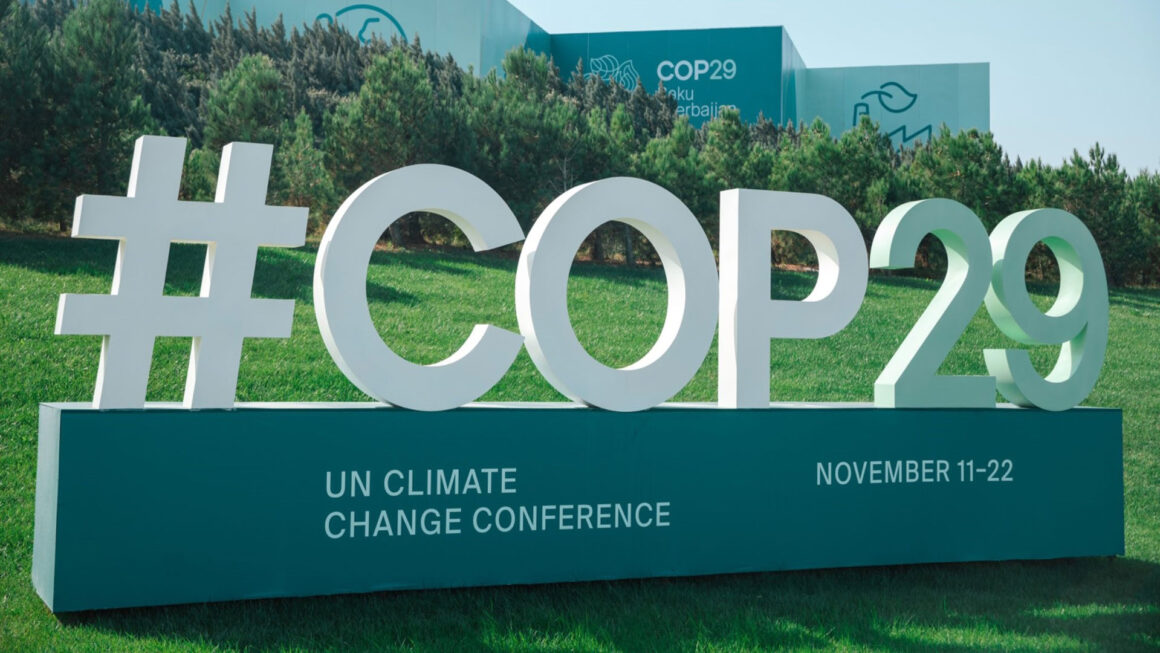

By Rebecca Anderson
The COP29 climate conference held in Baku, Azerbaijan’s capital—the original oil city—once again demonstrated the total inability of capitalism to solve the climate crisis.
On the one hand we have rising temperatures and increasingly severe environmental impacts, and on the other we have new technologies and enormous scientific and human resources. But our economic system cannot match the solution to the problem unless there’s profit to be made.
In addition, imperialism, the highest stage of capitalism, where a small number of powerful states dominate and exploit the rest, has an enormous effect. In general these nations are the great historic polluters, but they refused to listen to the pleas of the great majority of countries already being hit by climate catastrophe.
COP29, the ‘finance COP’ designed precisely to help these countries, nearly collapsed under the weight of these contradictions. Finally, 33 hours after the deadline and multiple walkouts, countries of the Global South accepted what the representative from India dismissed as ‘a paltry sum’.
It promised less than a quarter of the funding required to deal with the effects of climate change and fund the transition to renewable energy. The African Group of Negotiators described the final pledge as ‘too little, too late’.
Climate injustice
The year 2023 was the hottest on record, a dubious honour that 2024 is likely to surpass. Despite the Paris Agreement of 2015, which aimed to limit global warming to 1.5 degrees celsius above pre-industrial levels, temperatures have already exceeded this critical threshold. The effects are most acutely felt in the Global South, where countries are on the frontline of climate-induced disasters, but the bulk of carbon emissions have been generated in the Global North.
Each country’s delegation, of course, represented its own short-term economic interests. One of the most contentious points at COP29 was the opposition from Saudi Arabia and other fossil fuel exporters to any measures aimed at transitioning away from carbon. In a scandal now overshadowed by the main business of the conference, the chief executive of Azerbaijan’s COP29 team, Elnur Soltanov, was filmed discussing ‘investment opportunities’ in the state oil and gas company with a man posing as a potential investor.
It is widely accepted that $1.3 trillion annually is required by the Global South, however, the deal commits the Global North to providing just $300 billion per year. Much of this is expected to be in loans rather than grants—some is even supposed to be generated from private investors—further exacerbating the indebtedness of the Global South and the stranglehold of financial institutions and wealthy nations.
Panama’s lead negotiator Juan Carlos Monterrey Gomez aptly described these amounts as ‘outrageous, evil, and remorseless,’ stating, ‘They offer crumbs while we bury the dead.’
While the final deal acknowledges the need for the $1.3 trillion figure, those countries that signed up will only be committed to providing £300 billion. How long the second most polluting and richest country in the world, the US, will stay committed is up to climate denier Donald Trump.
This glaring shortfall has led organisations like WaterAid and Greenpeace to describe the agreement as ‘a death sentence for millions’ and ‘woefully inadequate,’ respectively. Even the $300 billion cannot be relied upon, as the wealthy countries have failed to honour their 2009 commitment to provide $100 billion per year.
Rising climate-scepticism
Many of the leaders of the imperialist states were conspicuously absent from the conference: the US, France, Russia and China all declined to send their heads of state, as did India. The elephant in the room at COP29 was Trump’s electoral victory, and the likelihood that he will once again withdraw from the Paris Agreement.
His climate-scepticism, matched by Argentina’s Javier Milei and other right wing populist leaders, reflects the fact that the costs of climate change are being forced not only onto the Global South but also onto the working and middle classes in the Global North. The backlash has fed into the rise of the populist right.
It is worth noting that a number of European right-wing leaders such as Hungary’s Victor Orban and Italy’s Giorgia Meloni attended the conference, but with their own agenda. Italy is focused on preventing an increase in migration resulting from environmental degradation. Meanwhile Orban is eyeing up the growing markets in ‘electric vehicle development and electricity storage’.
The inability of COP29 to secure adequate funding and meaningful commitments underscores a larger issue: the capitalist system is inherently incapable of solving the climate crisis. The global working class, through their unions and parties, must lead small farmers, peasants and the rural and urban poor in a struggle to take hold of the economic and industrial levers that can achieve a truly just transition, not only to save but also to change the world.
But the outcomes of COP29 demonstrate how hard we must also fight under the current system for every inadequate measure, and then fight to defend it against not just the incursions of the market but also rising nationalism and climate-scepticism. The struggle for socialism is inexorably bound up with the struggle for climate justice and we cannot have one without the other.